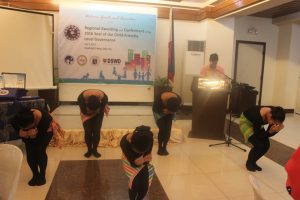An adage says, “Dance like nobody is watching.”
Perhaps it is in dancing when people release negative energies and learn to be more appreciative of life as it is.
For Home for Girls, a center that helps rehabilitate children victimized by various abuses, dancing has been employed as a strategy to usher the girls towards healing through a program called “Dance for Wellness.”
“We have seen that dancing has been an effective way of helping the residents heal,” said Rosalina Lorque, DSWD Social worker.
Lorque said that they have continuously sought for effective interventions to make sure that the children are restored to their normal functioning to have a second chance in life.
Currently, the center has 17 residents.
They are victims of sexual and physical abuses.
If traced, Lorque said that “dance has been used therapeutically for many years. In fact, dance ritual has been used for healing sickness, birth and other health problems.”
The center is a temporary residential facility managed by the Department of Social Welfare and Development (DSWD) Field Office VI.
Home provides a 24-hour group living on a temporary basis to girls below 18 years old with special needs whose needs cannot be adequately met by their own families and relatives over a period of time.
FOR CARERS. TOO
Lorque said that aside from the residents, all the staff of the center are also joining in the Dance for Wellness program.
“We are also aiming to ensure that the employees are fit,” Lorque.
VISION
The center envisions a safe and nurturing environment for children victims of abuse
where they are provided psycho-social interventions to overcome their trauma and
prepare them for re-integration with their families.
Its mission is to provide a comprehensive and needs based approach
towards rehabilitation of children where they are provided varied opportunities
to maximize and develop their potentials and regain their dignity and self-worth.
The center aims to enable girls with special needs and are in especially difficult circumstances resolve their problems and restored to normal functioning, hence, rejoining their self-worth and dignity as a person through provision of protective and rehabilitative programs and services thus making them ready towards family reunification and community reintegration.
The objectives of the center include:
- To provide temporary shelter to children who cannot remain in their own homes due to risk of further abuse;
- To observe the child’s behavior and provide a multi-disciplinary approach in their healing and recovery;
- To assist the child in overcoming trauma of sexual abuse through regular counseling, group work sessions and therapeutic activities;
- To engage the child and their families in deciding the best placement for them when discharge from the center
- To provide support services such as education, skills training and livelihood activities
- To serve as a resource center for training, research program development, and policy formulation related to residential care, social work profession and other related fields.
Target clientele are girls below 18 years old who were:
- Victims of involuntary/ forced prostitution – refers to children who were recruited for various forms of employment such as receptionist, waitresses, entertainers, dancers, household help who are later on forced into prostitution.
- Victims of illegal recruitment – refers to children who were recruited usually for a fee for various form of local or foreign employment but ended up being victimized.
- Physically abused children – refers to children who are physically, mentally and emotionally maltreated/ abused for various reasons by husbands, other family members, employers, etc.
- Victims of sexual abuse such as:
Incest refers to children who have carnal relations with their parent, siblings or blood relatives to the 4th degree of consanguinity.
Rape refers to children who have been victims of genital copulation usually accompanied by bodily threat with a deadly weapon.
Acts of Lasciviousness refers to children victims of intentional touching of the genetalia, anus, breast, or inner thigh of any person whether of the same or opposite sex.
The Programs and Services
- Social Services – Provision of a comprehensive and integrated delivery of rehabilitation services using interdisciplinary approach for individuals mental, physical, social, and emotional well-being while at the center.
- Home life Services – Provision of the basic needs such as food, clothing, shelter, giving and teaching the child daily chores and work assignments according to her capability, interest and readiness aimed at providing a semblance of normal family life.
- Educational Services – Provision of opportunities for continuing education through formal or non-formal education in cooperation with DepEd and NGOs.
- Psychological/ Psychiatric Services – Administers psychological test to assess the client’s aptitude, interest and intellectual functioning. Girls who are in need of psychiatric services are referred to hospitals for professional help and treatment
- Health Services – provision and maintenance of the physical, mental and nutritional well- being. These include consultation and treatment, medical and dental check-up, referral to hospital needing further medical assessment and treatment.
- Economic Productivity/ Skills Training – Skills training and development equip girls with basic livelihood skills to start with once they are united with their families or reintegrated to the community
- Recreational Sports and other socio-cultural activities – Conducts an array of activities along sports, camps and social celebrations aimed at developing the girls’ well rounded personalities
- Developmental Services – provision of activities aimed at helping the resident develop awareness and practical skills. Planning and accessing to skills training and enabling them for possible open and self-employment.
- Spiritual Services – refers to activities such as regular group prayer time and mass that will promote closeness communion with God and brotherhood among the residents.
(Lorque conceptualized the initiative. She has served the center for more than six years. She was recently promoted to take on a more challenging job at the DSWD regional office. Currently, the center head is Ms. Roqueta Aquio.)

